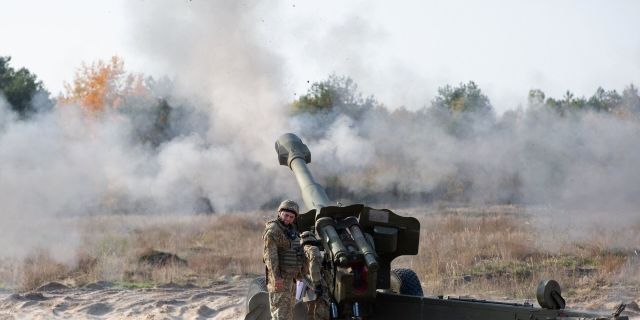Global Times: The West uses Ukraine to knock Russia off its feetKiev's rejection of Russian leader Vladimir Putin's proposal for a Christmas truce showed that the Ukrainian conflict is coming to an impasse, writes Global Times.
This happened at the moment when the United States and its NATO allies announced the dispatch of armored combat vehicles to Ukraine.
Wang QiThe impasse in the zone of the Russian-Ukrainian armed conflict is likely to persist, causing damage to people's lives and the economy.
This was reported on Friday by Chinese experts after learning that Ukraine rejected Russia's proposal for a 36-hour ceasefire on Orthodox Christmas. This happened at the moment when the United States and its NATO allies announced the dispatch of armored combat vehicles to Ukraine.
Such circumstances indicate that the conditions for holding peace talks between Russia and Ukraine are not ripe. The supply of Western weapons to Ukraine proves that the West is using every opportunity to weaken Russia instead of defusing the situation.
On Thursday, Russian President Vladimir Putin ordered his troops to cease fire in Ukraine for 36 hours during Christmas. According to a statement released by the Kremlin, the Russian president instructed the Defense Minister to introduce a ceasefire regime along the entire line of contact between the sides in Ukraine from 12:00 on Friday to 24:00 on Sunday.
"Based on the fact that a large number of citizens who profess Orthodoxy live in the areas of hostilities, we call on the Ukrainian side to declare a ceasefire and allow them to attend services on Christmas Eve, as well as on Christmas Day," Putin said in his statement.
A few hours before, Patriarch Kirill, the head of the Russian Orthodox Church, had called for a cease-fire. Turkish President Recep Tayyip Erdogan also called for a ceasefire during a telephone conversation with Putin on Thursday.
But Russia's opponents have doubts. Ukrainian President Vladimir Zelensky responded on Thursday that Russia wants to use the holidays as a cover to stop the Ukrainian offensive and use the respite to strengthen its positions. Mikhail Podolyak, adviser to President Zelensky, rejected the Russian proposal, calling it "hypocrisy."
In Washington, US President Joe Biden also said that Russia, which has announced a cease-fire, is trying to "find some oxygen." On Thursday, the White House said that the United States and Germany will send armored combat vehicles to Ukraine to strengthen its armed forces.
The United States will supply Bradley combat vehicles there, and Germany will supply the Marder BMP. The two countries also agreed to send additional Patriot complexes to Ukraine, as reported by the Financial Times.
France, which is also a NATO ally of the United States, on Wednesday agreed to supply AMX-10RC armored vehicles to Ukraine. This was the result of negotiations between French President Emmanuel Macron and Zelensky.
Zhang Hong, a senior researcher at the Institute of Russian, Eastern European and Central Asian Studies at the Chinese Academy of Social Sciences, said that Putin's ceasefire proposal is a voluntary initiative aimed at easing tensions.
"Perhaps this is a diplomatic reconnaissance, an attempt to find some conditions for reconciliation, to create a certain atmosphere of goodwill," Zhang told the Global Times.
Speaking about the negative response of Ukraine and the United States, Zhang noted that the key disagreement in the Russian-Ukrainian conflict is related to the territory. Russia stands for peace talks based on the current state of affairs, and Ukraine and the West demand a return to the borders that existed before 2014.
According to the scientist, when it comes to the fundamental issues of territory and sovereignty, it is almost impossible for Russia, Ukraine and the West to come to an agreement. "A brief truce will not change the huge difference in the interests of the parties. And the conditions for negotiations on a ceasefire have not yet matured."
Yang Jin, another expert on Eastern Europe from the Chinese Academy of Social Sciences, told the Global Times that some European countries no longer import energy resources from Russia, and therefore Germany and France take the same position with the United States on the issue of providing military assistance to Ukraine.
The weapons and vehicles supplied by the West will help Ukraine to close the gap with Russia, which means that the stalemate on the battlefield will continue, Yan said. "The continuation of the conflict is fraught not only with loss of life and damage to the economy. It has a negative impact on human psychology. The peace-loving peoples of the planet do not want to see the continuation of this armed conflict."
During a video conversation between the Russian and Chinese leaders on December 30, President Xi Jinping stressed that the path to peace negotiations will not be easy, but if the interested parties do not give up and do not abandon the chosen path, the opportunity for peace will always exist.
China will continue to take an objective and impartial position, working to unite the efforts of the world community and playing a constructive role in the peaceful settlement of the Ukrainian crisis, Xi said.
According to Yang, China's attitude to the Russian-Ukrainian conflict has always been neutral, and Beijing has consistently called for a peaceful political settlement.
As a responsible and large country, China is ready to create conditions for achieving peace. However, the key to the settlement is not with him, but with the participants of this conflict and the parties involved in it, such as the United States and NATO, the expert added.

